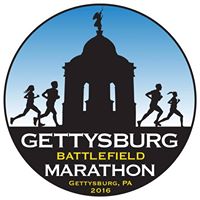Gettysburg Battlefield Marathon Organizers Denied Permit
By Kurt Repanshek on March 9th, 2018
from National Park Travelers
Is it appropriate to stage a marathon at a Civil War battlefield site, or is the hallowed setting the wrong place for runners and cheering? That question has surfaced this week as the organizers of the Gettysburg Battlefield Marathon say the National Park Service has denied their request for a permit to stage this year's race.
"We officially learned Monday the National Park Service will not be approving our permit application as submitted," race organizers Alex Hayes wrote on the marathon's Facebook page. "They have some concerns about the appropriateness of running a marathon on hallowed ground and supporters cheering at places designed for moments of solemn reflection.
"We have mixed feelings about this. We certainly respect the National Park Service’s views in 2018, but are frustrated because the park approached us in 2016 to organize the marathon," they added. "There is new leadership at the park. They have the right to disagree with their predecessors."
Gettysburg National Military Park spokeswoman Katie Lawhon said Thursday that the park did encourage the marathon for 2016 as part of the National Park Service's centennial celebration. While the race returned in 2017, she said park staff decided that the route that was being used was not appropriate for the race.
Concerns voiced by both park staff and Gettysburg visitors, said Ms. Lawhon, concerned "(T)he footprint of the event, so to speak, and the spectators. Water stations and where there were spectators cheering and clapping for hours on end. Those impacts on places, very meaningful places for park visitors” had become an issue.
A central part of the mission of the miliary park, she explained, is to provide visitors with an opportunity to reflect on the soldiers who fell at Gettysburg, and the consequences the battle had on the nation.
"It’s very hard to pair that with what was physically happening here during the marathon," said Ms. Lawhon.
While the marathon in its first two years utilized roads that in some cases literally maked lines of battle and went past "places like Little Round Top and other places where there were major battles," park officials did offer race organizers the use of other park roads that were not so closely aligned with actual battles for this year's race, she said.
“We’re trying to find a way to reduce some of the impacts. If the marathon can still happen or not, it’s up to the organizers," said Ms. Lawhon.
The question of an event's appropriateness in a national park setting is not a new one. Not too many years ago there was a dispute over whether a professional bike race could go through Colorado National Monument. While then-National Park Service Director Jon Jarvis denied that request, there was no opposition when a portion of a professional bike race in Utah went through a sliver of Bryce Canyon National Park, albeit on a state highway.
And for the Park Service centennial, the Tour of Utah bike race was allowed to pedal, not race, through Zion National Park, a move that drew concern from the National Parks Conservation Association.
